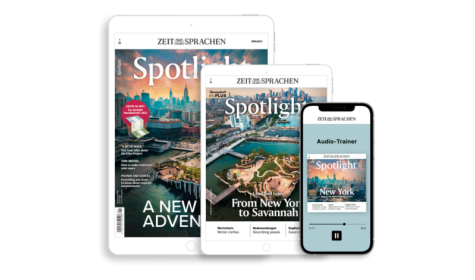Adrian Doff presents and explains this key point of grammar with notes on a short dialogue. Read the dialogue and the explanations and try the exercises below.
Dialogue and explanations (please click on the arrow to expand)
Dialogue
Three friends are playing a quiz game.
Rachel: Right! I’ll ask you a question, and the first person to answer the question (1) gets a point. OK?
Boris: OK.
Rachel: The first question is on history (2). What nation invented fireworks (2)?
Boris: The Chinese (3).
Rachel: Yes. One point for you, Boris. OK, here’s another one. Who invented the telescope (4)?
Elena: Er... Galileo?
Rachel: No.
Boris: I know. It was Hans Lippershey. He was Dutch.
Elena: How did you know that?
Boris: I saw a programme about him on TV (5). Galileo went to visit him and then used his idea.
Elena: I was always useless at history at school (6). How about a question on music?
Rachel: OK. Who sang and played the piano (7) at Princess Diana’s funeral in 1997?
Elena: How should I know that? I was only three years old at the time. That’s not about music. It’s another history question.
Explanations
- Use the before a noun that one already knows about. (Rachel says “a question” and then “the question”.)
- Don’t use the before uncountable or plural nouns (“history”, “fireworks”) that you mean “in general”.
- Use the with some nationalities: “the Chinese”, “the English” (= Chinese people, English people).
- Use the before singular countable nouns (“the telescope”) to talk about a class of things “in general”.
- Leave out the in the phrase on TV, but say “on the radio”. (See page 44: “Whether people watch it on TV, listen to it on the radio or check it online, everyone is interested in the weather forecast.”)
- Leave out the in phrases like “at school”, “at home” or “at work”.
- Use the with musical instruments (“...who played the piano”).
Remember!
Use “the”...
before nouns that have been mentioned earlier, or that are already known about:
- I’ll put the beer in the cellar.
before singular countable nouns, when talking about a general category:
- The computer has changed our lives.
with names of rivers, oceans, seas and regions:
- the Thames, the Mediterranean, the Middle East
with musical instruments (after “play”):
- play the piano, play the guitar
before superlatives:
- It was the best holiday I’ve ever had.
Don’t use “the”...
before uncountable and plural nouns, when talking about a general category:
-
I love nature.
-
Computers have changed our lives.
in some fixed expressions with prepositions:
-
on TV, at home, at work, at school, on holiday, in bed, in hospital (UK)
Beyond the basics
You can sometimes use the to talk about a group or category of people, to form plural nouns from adjectives:
-
The gap between the rich and the poor (= rich people and poor people) is growing.
Now, test your knowledge with the exercises below.
Neugierig auf mehr?
Dann nutzen Sie die Möglichkeit und stellen Sie sich Ihr optimales Abo ganz nach Ihren Wünschen zusammen.



